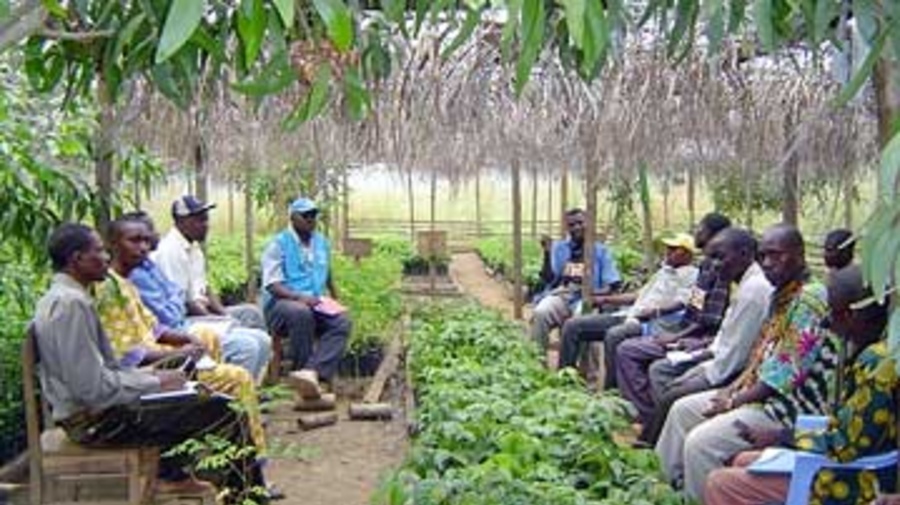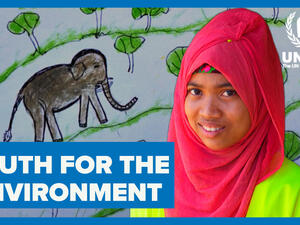Angolan refugees help to rehabilitate Congolese camps
Angolan refugees help to rehabilitate Congolese camps

The enviroment protection committee in Nkondo meets to brainstorm on how to protect young trees from bush fires.
KIMPESE, Democratic Republic of the Congo, June 3 (UNHCR) - It's common courtesy to clean up after yourself, but some refugees in the Democratic Republic of the Congo (DRC) have gone one step further by greening their camps before repatriation.
More than 17,000 out of a planned 60,000 seedlings have so far been planted in the villages of Nkondo and Kilueka in the Bas Congo province of south-western DRC. The area hosted more than 23,000 Angolan refugees for six years, but fewer than 3,000 of them are left now after the majority headed home to Angola.
These days, the two villages are almost empty in the morning, as their inhabitants, equipped with shovels and hoes, work in the bush land where the young seedlings are planted. "Wild weeds are suffocating the young trees," said Jean Diakese of Nkondo village while rooting out weeds sprouting around the seedlings.
To lessen the refugees' impact on their environment, UNHCR had set up two tree nurseries at the Nkondo and Kilueka refugee sites. The target is to grow 30,000 in each village area, or one tree for each house. The refugee agency distributes the seedlings free of charge to the local population. An environmental protection committee comprising Congolese villagers and Angolan refugees has been established to safeguard the nurseries and to sensitise the population. Only their participation will guarantee the project's success.
The project's beneficiaries have chosen the tree species themselves. They asked for fruit trees. "These plants mean wealth to us," explained Joseph Kinzunga, the chief of Ndembo village in the Kilueka area. "Apart from selling and eating the fruits, we also thought of making fruit juices."
As a result, the nurseries are populated by different varieties of fruit trees, including citrus fruit trees - mainly orange and mandarin - as well as avocado trees and Safutiers, whose grilled fruits make a good side dish to meat. Acacia is another species used in the reforestation programme, as specialists say that the tree can adapt to all soils and is not very demanding.
More experimental species are also cultivated for their different virtues: The leaves of the Kikalasa are edible, while the plant itself contributes to the enrichment and fertilisation of the soil.
The Moringa tree also has multiple uses. "Every part of this plant is important," stressed Charles Muanda, an agronomist working with UNHCR's implementing partner, Oxfam. "The leaves can be eaten and are used for the treatment of certain diseases. The bark and the roots can be used to produce medicines against diarrhoea, high blood pressure, hepatitis and other illnesses. The fruits are also important, as one can use the oil extracted from them. Finally, the oilcake is used to purify water."
Both the refugees and their hosts know that the trees will only bear fruits after at least three or five years of hard work and patience. These fruits are destined for consumption, but also as cash crops on the market.
In addition, the trees are important for the environment and for human life, filtering and refreshing the air. As a result of this reforestation programme, it will be easier to fight soil erosion, which is already visible around Nkondo.
The current dry season makes the trees vulnerable to man-made bush fires, but the provincial authorities, through the local radio station, have been appealing for vigilance and threatening punishment for the arsonists.
In some cases, the seedlings have been trampled by wandering livestock belonging to herdsman, but these animals have now been fenced off from the young trees.
"After our repatriation, the Congolese population will remember us for the trees we plant today," said Edouardo Matota, the president of Angolan refugee community in Kilueka.
By Simon Lubuku in Kimpese, Democratic Republic of the Congo









